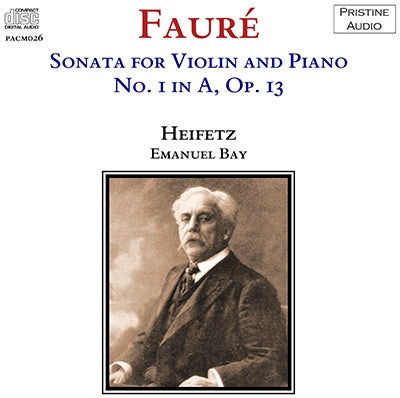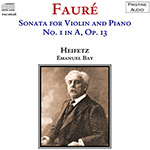
This album is included in the following sets:
This set contains the following albums:
- Producer's Note
- Full Track Listing
- Cover Art
Heifetz and Bay's fabulous 1936 New York Fauré
XR remastered for finest sound quality
Heifetz was
undoubtedly one of the greatest violinists ever. He appeared to have
been born with an almost perfect technical ability, yet as this
recording dislays over and over again he could also play with great
feeling and emotion.
Perhaps due to his long career, some of
Heifetz's earlier recordings from the 78rpm era have suffered a
surprising degree of neglect. A major retrospective of his recordings,
issued in the mid-1990's, was strongly criticised for the lack of
attention paid to this earlier material. With this newly remastered
issue of this lovely 1936 recording we hope in a small way to start to
put this right.
From a technical point of view, restoring this
recording left me being pulled in two directions at once. The piano is
somewhat distant and restrained, whilst the violin is very much to the
fore and had a tendency towards being shrieky. I also wanted to retain
the rosin-flying aspect of some of the violin work, as well as the
incredible delicacy heard elsewhere, without leaving a lot of surface
noise and hiss, both of which were as high as one normally expects from
mid-1930's British 78s. I hope I've succeeded in all of this - but
invite you to judge for yourself.
Andrew Rose
-
FAURÉ Violin Sonata No.1 in A major, Op. 13
Recorded 10 February 1936, Victor Studio No. 3, New York
Released as HMV 78s, D.B.3176-3178
Matrix numbers: 2A: 99565-70
Download ID: 181758, 390704
Duration 21:17
Jascha Heifetz, violin
Emmanuel Bay, piano
Bill Rosen's Review
A masterpiece. Heifetz is, of course, dazzling
This is Faure's first substantial piece of chamber music and it is a
masterpiece. Heifetz is, of course, dazzling (is he ever not?) and he
negotiates the double-stops early in the first movement so they sound
intensely Schumannesque and not just hard to play. The Andante is
open-hearted and songful; the scherzo is almost too brilliant. The
finale goes by in a glorious whirl, and suddenly it's over, and I'm left
a little hungry. It's like a meal you've eaten while you watched an
exciting episode on TV. Where did it go? And wasn't Faure supposed to be
a French composer?
I decided to get a second opinion. I listened
to Jacques Thibaud and Alfred Cortot from 1927. From the opening piano
notes, we are in France, in a summer garden of light and shade. Then
Thibaud comes in with a cramped, narrow tone and perhaps not always
perfectly on pitch after the gleaming perfection of Jascha. If only
Cortot and Heifetz had been paired.
I decide to try a modern
performance and choose Joshua Bell and Jean-Yves Thibaudet. Beautiful
violin and piano sound, very French atmosphere, but so much meditation, a
bit of ponderousness here and there. This IS Opus 13, not 113.
I
finally give in and go back to the Heifetz/Bay and am swept away by its
brilliance and vigor, even if still pursuing the ideal Faure, Op. 13.
The sonic restoration is part of its mystique.

